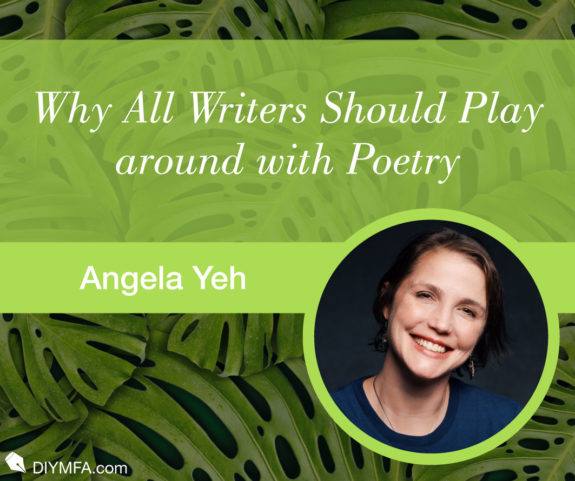Everyone should play around with poetry. Period.
Your hairdresser. The mail delivery person. The landscaper, the hummingbird feeder refill person. The person who diligently washes, folds and presses your socks.
And, for sure, writers should play around with poetry.
I’m talking to you, non-fiction writers. I’m talking to you, business and copywriter, you life coaches blogging away about practical steps to evolve the life you want. Hey you—yes, you, that serious journalist with the Pulitzer prize for your coverage of the public health crises of gun violence in the US—I am for sure talking to you about poetry right now.
You might think poetry is only for those sensitive, mysterious literary souls who see magic in the glow of green from a leaf in the sun.
This is erroneous. (I used that word for you, technical copywriter!)
If you have a minute, I can assure you that poetry will make your everyday writing infused with life and light.
Yes, even you, instruction manual writer (are there any of you out there? I am so sorry for never, ever reading them).
Poetry Redefined
Let me redefine poetry for you in a way that makes more sense:
Poetry is a literary work in which special intensity is given to the expression of feelings and ideas by the use of distinctive style and rhythm. (Lexico.com)
Writing how you feel with style and rhythm.
Like a song.
Like Eminem’s popular hit, Lose Yourself.
And you don’t even have to sing what you write for millions of fans.
If you’re still with me, I can tell you are already three steps ahead of this article and are realizing how therapeutic playing around with poetry can be for all kinds of intense emotions like anxiety, depression, shame, and even grief.
So many writers shy away from poetry—and I can understand why. It’s like shining a spotlight into the deepest, darkest sides of your soul. I can see why most writers would rather pretend that kind of belly gazing is for the elite few.
Why you should consider playing around with poetry
Playing around with poetry will improve your writing. You might say, “Says you, Angela Banagela, but how does it do that?” I see you, skeptical engineer/memoir writer, and good job rhyming my name.
There are three main ways writing poetry improves prose and those are forcing us to focus, to be mindful, and to work within the restraints of structure.
Focus
Poetry forces you to focus on one moment. That green leaf glowing in the sun. Or on what you are feeling.
Did you know most people can only name three emotions? Anger, sadness, and happiness. We are complex social beings with the capability of feeling many things at once. When you try to put that into words and do it with style and rhythm, something in your heart breaks open and you realize there are other feelings hidden beneath the obvious.
Writing poetry is probably the only time I am focused enough on myself to realize how sad I am. Or how joyful. Usually, both at the same time.
About a year ago I sat down and wrote a happy poem about being outside with my toddler, how his inner wild and nature’s outer wild echoed and reflected back at each other. And in the end I realized I was also sad because I knew this time would be short. That soon enough he would be grown and gone, but I wanted to remember that small jewel of a memory. Like a photograph not just of a moment in time but of how we were that day. Joyful, sad, content, grateful.
Mindful
Poetry slows us down. Poems are such powerful, economic animals. You must choose your words thoughtfully, methodically, and mindfully. You could get lost in the effort and when you look up from your paper you realize you’re not the same scattered, stressed-out person who started it. If you haven’t tried meditating for stress relief, try writing poetry first.
Structure
Some poetry have rigid rules around rhyming, placement of syllables, and even form and theme. I’ve spoken lovingly about Haiku in the past, but that is not the only form of poetry that requires us to work within restraints.
Going from freewriting to a Sonnet, for example, can get all the wheels working from your logical-analytical brain to your limbic system to your creative side. It’s like a workout for your brain AND heart.
Playing around with poetry is just good for all the systems we need to be functioning well in order to be a positive, contributing member of society. And…fun.
Practice Playing around with Poetry
I won’t leave you flailing about with that blank sheet of paper staring at you, don’t worry, I got you. Try this next time you’re stuck on an article, or you can’t get motivated:
We’re going old school here: grab a pencil and paper (I like those small spiral notebooks they sell at Walmart), then write the first few thoughts that come to mind when you hear the word “spoon.”
Write as long as you like.
Have fun with it.
I bet you’d be surprised how much your mind has to say about something as innocuous as a spoon.
When you feel like you’re done, try to make a rhyming poem out of it. Give yourself 15 minutes to write whatever rhyming scheme you want. AABB, ABC, ABC, you get the picture.
You don’t have time to do this right now—you just read this whole article! Throw the notepad and a pen in your purse (or man bag) and next time you’re waiting and realize you forgot your book, try scribbling out a poem about a spoon, see what happens.
As usual, Neil Gaiman said it best:
“If you dare nothing, then when the day is over, nothing is all you will have gained.” The Graveyard Book.
Tell us in the comments: How will you play around with poetry today?

Angela Yeh is an East Coast Canadian native that lives and works in the great state of Texas. Angela loves to garden, write about magic, and eat cake. If you’d like to check out her first published novel, A Phoenix Rises, a finalist in the Dante Rossetti Book Awards for Young Adult Fiction for 2021, that would be peachy. Angela lives with her family, three cranky fur babies and a gecko. You can follow her on Twitter and Instagram or her website.







